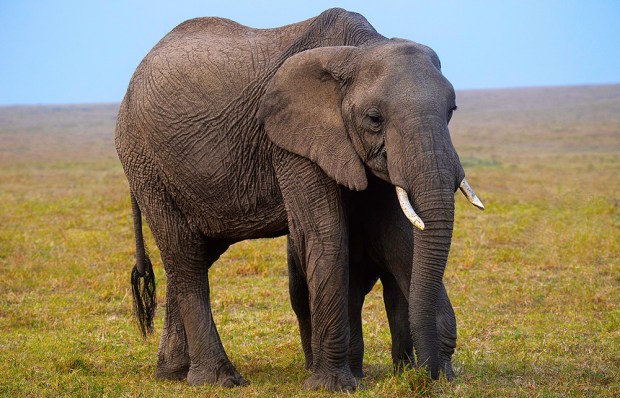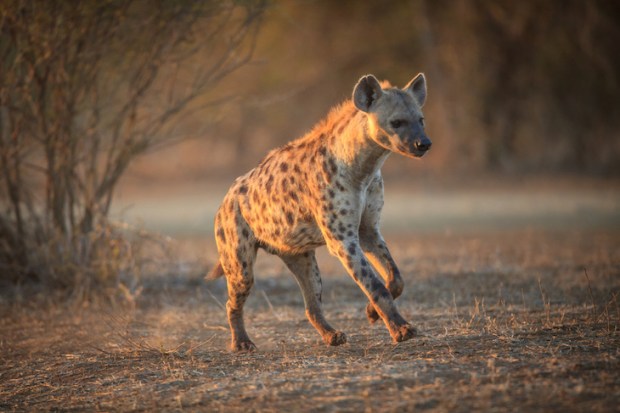
Kenya
While staying recently on a lonely farm in the Highveld east of Johannesburg, I met a grey parrot that could sing ‘Die Stem’, South Africa’s apartheid-era national anthem. That bird was certainly out of step with the times. We all know that after Mandela’s 1994 election the rainbow nation switched to ‘Nkosi sikelel’ iAfrika’. I was on the farm researching a story on the grisly culture of crime in a country about to host the World Cup. Incredibly, 18,000 murders are committed every year in South Africa. Before bedtime, my hosts put the huge dogs out and locked up the house against gang attacks. Sometimes the ‘hit squads’, as the farmers call them, fire through the house windows so even locked doors provide little comfort. ‘Vaderland!’ crooned the parrot. ‘Waar en trou as Afrikaners!’
It reminded me that my long-deceased great-aunt Marguerite once had a grey parrot. She lived with Uncle Jim in a nice house with a large garden in Cooden Beach. They had no children and did not keep dogs, but they had a parrot. He lived in a cage next to the telephone in the hallway, where he whistled and talked a lot. When anybody knocked at the front door, he would say in Aunt Marguerite’s exact voice, ‘Oh, do come in. It’s so good to see you.’ When guests left he cried, ‘Goodbye now, do come again!’
My aunt and uncle were keen on tennis. Often they put on whites and played mixed doubles. One hot summer’s day they drove off in their car piled with racquets and left the bedroom window open upstairs. As soon as they were out, a thief, who had been casing the joint, crept through the back garden and climbed up a ladder and into the bedroom. Inside he went to the dressing-table drawers and found Aunt Marguerite’s jewellery, which he began laying out ready to steal.
At that moment the telephone rang in the hall downstairs. After several rings the thief was alarmed and surprised to hear a voice loudly answer, ‘Hullo, hullo, Cooden Beach five oh five, Marguerite speaking!’
The thief later told the magistrate he had been sure that the house was empty. Then he realised his mistake, because a maidservant must have stayed behind. In modern Sussex, or indeed anywhere else in the world today, you can imagine the thief would be armed with a Ceska pistol. He would be accompanied by a few of his mates, all of them suffering skunk psychosis. They would storm downstairs intent on murder, only to find nobody in the hall except for an African grey parrot — and this really would do their heads in. But, thankfully, there is not even the insinuation of violence here since this is still a summer’s day in Cooden Beach, circa 1967. I imagine the burglar had a stripy shirt and a stocking over his head.
The thief took fright. He abandoned his swag, climbed down the ladder and ran away. I do not know how but he was later arrested, possibly because in those days the police actually caught criminals without the use of CCTV footage. The story made the front page of the Bexhill newspaper.
Back in Mpumalanga, modern-day South Africa, the Boer parrot was singing, ‘Kinders van Suid-Afrika!’ I thought the bird’s political affiliations would probably encourage rather than deter crime. My host was getting ready for bed by cocking an R5 assault rifle. I asked him if, when the firing started, he might be able to lend me a weapon. ‘Sure,’ he said, and showed me the spare pump-action shotgun he called his corridor cleaner, because of the effect it had on a gang of robbers in a passageway. And I decided it was high time the Afrikaner parrot learned the new South African President Jacob Zuma’s favourite song ‘Lethu Umshini Wami’ — ‘Bring me my machine gun’.
Got something to add? Join the discussion and comment below.
Get 10 issues for just $10
Subscribe to The Spectator Australia today for the next 10 magazine issues, plus full online access, for just $10.














Comments
Don't miss out
Join the conversation with other Spectator Australia readers. Subscribe to leave a comment.
SUBSCRIBEAlready a subscriber? Log in